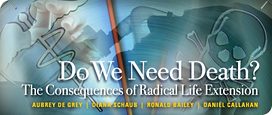Over a long career I have argued on all kinds of issues with all kinds of people. Aubrey De Grey and his colleagues are among the most frustrating to have a serious debate with. They are single-minded believers, and like the tribe of them, they paint their cause as splendidly noble. DeGrey, humanitarian to the core, is trying to save us from “mankind’s greatest remaining scourge.” Their opponents, by contrast, are “stunningly irrational.” For their part, the humanitarians stand comfortably, even blissfully, on the side of science and reason; their enemies (so says Bailey) favor repression and bans. They know where we should be going and not a trace of uncertainty seems allowable in their tidy, well-lit room. Though they have not been there themselves, they know that aging is a great scourge. And they want to save us all.
I take a different stance toward schemes to radically remake our lives and improve our future. I agree with Ron Bailey that science has, on balance, done more good than harm. But when it is used to do harm, deliberately or inadvertently, it can do so in a devastating way. That does not, thankfully, happen often, but enough to keep us on the alert. In Hitler’s Nazism and Stalin’s Communism we got a good dose of utopian true believers, both of whom–as David Overy documents in his book The Dictators–believed that science would be our savior, and who went on to use its inventions to kill millions of people.
In the creation of poison gas and modernized warfare in World War I, and nuclear weapons and fire bombing in World War II, we learned about the evil uses to which scientific knowledge can be put. With global warming we can see what scientific progress and commerce-driven societies, addicted to endless material growth, can bring us. The George W. Bush administration shows us the dangers of messianic schemes to promote democracy and save us from terrorists. And with the anti-aging contingent we can see a group eager to take us into the future–the future of their scientific devising, not one most of us have been pressing for-and willing it seems to bring it about whether we like it or not.
I repeat my main complaint, to which I get no serious response. Please give us a road map, even a rough one, about what our future will look like with greatly extended life expectancies. How might procreation and childbearing look in the future, what kind of promotion and retirement policies might be put in place, what might happen to population size and the environment–and what steps might be taken to reverse course if it all started turning sour?
I use the word “might” because, as DeGrey and Bailey like to point out, no one can foresee how the future, or new scientific developments, will turn out and to demand precision on that is not only impossible but harmful to reform and progress. I ask for no precision, only that the topic be raised and talked about in their circles and a few answers provided for the rest of us. If we have learned anything about science, progress, and utopian schemes, it is that we should look before we leap, trying to make reasonably certain we are not setting the stage for bad outcomes. If the social impact of scientific developments is uncertain, as Bailey and DeGrey seem to concede, then it does not seem to me irrational to suggest that things can go bad as well as go good.
For some reason, the anti-agists do not want to tackle questions of those kinds. They wave at them, scoffing at those who worry. We’ll cross that bridge when we come to it, they seem to be saying. But unless they take them on we would be foolish to follow them. As Schaub points out, none of us who oppose their utopia want to ban the research. All we ask is for a good dose of public and scientific skepticism, the kind many people in recent years should have had when offered large mortgages with no down payment and (initially) low interest rates.
Anti-aging sounds like that kind of deal, too good to be true. The devil, it is often correctly said, is in the details. The anti-ageists love to dwell on the scientific details and how promising they are. It is now time to dwell on the social details to see whether they are equally promising.
Most important we need a level playing field. I consider it the moral responsibility of those skeptical of their schemes to say why, but no less the responsibility of the proponents to be self-critical. Tell us just why the world will be a better place if everyone lived much longer lives. Since there is no domestic or international health agency that has seen fit to declare getting old and dying a great scourge, nor has any economist or social scientist said that we will be better off economically and socially with much longer lives, tell us what we have all missed noticing. DeGrey, I suppose, would say they are all in a pro-mortalist trance, of course are a few billion others. But it is not self-evident that a utopian anti-aging trance is any better, at least from the arguments I have heard here.
Also tell those of us who are old, and see great social benefits for younger generations in our dying, just why we are wrong, why those of us who have led a full and satisfying life have a mistaken self-understanding. In short, just stop telling us how great it will be. We’ve heard that message. Now get serious about our qualms. The Elmer Gantrys of scientism are no more attractive than those of religious evangelism. Actually, it is not easy to tell them apart in the salvations they offer us. They sound eerily alike.

